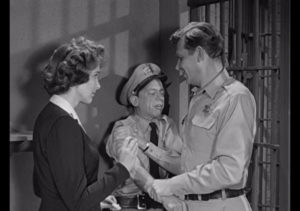 I find lessons for aid and humanitarian work, including public health education, all around me, if I’m paying attention.
I find lessons for aid and humanitarian work, including public health education, all around me, if I’m paying attention.
That includes watching the Andy Griffith Show, a 1960s television show that is still frequently shown in the USA. For my international readers: the show, mostly a comedy but sometimes dramatic, follows the adventures of a small town Southern sheriff and his family. It’s a highly sentimental, idealized show more about how people wish small town life was in the USA than it actually ever was. But I’m very fond of it because it shows the very real sweetness and eccentricities of small town anywhere, not just the USA, even if it’s highly romanticized and leaves out important facts of life in the Southern USA, like Jim Crow and the oppression of black Americans.
I recently saw one of the few episodes I don’t recall seeing when I was a kid. It’s called The County Nurse. The official summary: “Andy is forced to exert all his persuasiveness to get a farmer to take a tetanus shot.”
The premise is this: there is a county nurse – a government-funded health worker – that is visiting the town of Mayberry as a part of her job. The nurse has promised her bosses that she will have a 100% success rate in inoculations, but the person standing in her way on delivering on this promise is farmer Rafe Hollister, who has never had a tetanus shot. Rafe says he has never been sick and has never had to see a doctor and, therefore, doesn’t need this shot. In fact, he’s quite skeptical about vaccines in general. Sheriff Andy wants to help because he does believe in vaccines and because he is attracted to the new, and very pretty, county nurse and wants to help her out. At one point, Andy says to Rafe “go ahead and try the stethoscope. You can hear your heart beating!” And Rafe replies “I don’t need that to know if my hearts beating, I’m alive ain’t I? Then my hearts beating.” Rafe also says, “I ain’t never been to a doctor in my life. When I was born, I had my mama. When I die, I’ll have the undertaker. I don’t see no sense in clutterin’ up things in between.”
Andy offers the nurse advice at one point: “With a fellow like Rafe, you don’t just walk up and say ‘let me give you a tetanus shot.’ You hafta kinda make him trust ya first. Gain his confidence. Well ya sneak up on him is whatcha ya do.” And that’s just what they do: Andy finally uses his singing and storytelling ability to shock Rafe into taking his shot. Andy sings a sad song,”Dig my grave with a silver spade,” and talks about what Rafe’s funeral will be like if he dies from tetanus. Rafe relents at last.
It’s an episode where city sensibilities and country ways clash. The wariness of the country folk towards doctors and formal medicine is stressed – and not for the first time in this show. The only thing missing from this episode to make it more realistic would have been Rafe repeating crazy beliefs about vaccines.
You can find pirated versions of this episode online relatively easily. It’s less than 30 minutes long.
Sadly, I don’t think we have county nurses anymore…
Also see:
- What Mad Men Can Teach Nonprofits & NGOs About Story-Telling
- Can fiction help us work better in humanitarian aid & development? Yes.
- TV depictions of volunteerism
- Aid workers in fiction – new ABC show in January in 2011
- Folklore, Rumors (or Rumours), Urban Myths & Organized Misinformation Campaigns Interfering with Development & Aid/Relief Efforts, & Government Initiatives (& how these are overcome)

